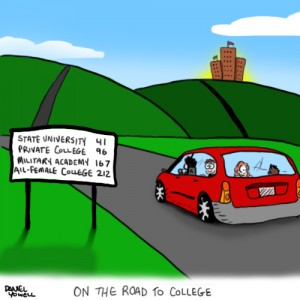 Only a few years ago, online education was the realm of the non-traditional student. Whether you were a high school dropout, a dad working three jobs, or a retiree who simply wanted to take some classes, chances were that you were not a typical college student if you were signed up for courses online.
Only a few years ago, online education was the realm of the non-traditional student. Whether you were a high school dropout, a dad working three jobs, or a retiree who simply wanted to take some classes, chances were that you were not a typical college student if you were signed up for courses online.
In the last couple years, however, that has changed. In an era of tablets, smartphones, and omnipresent technology, it only makes sense that education – both traditional and otherwise – would gradually bleed into the virtual world.
Now, more than ever before, a high school student or even college student from a traditional university can be found taking classes online. Here, generally, is what prompts these students to do this:
The Motivated Student
This student is enrolled in a traditional university – or, perhaps, they are a high school student who is about to matriculate to one – and they seek an intellectual challenge they cannot find in the classroom. Their classes may be too easy or the subject they seek to study may not be offered; either way, this student is self-motivated enough to go online and find an alternative.
The Prerequisite Search
Imagine that you signed up for a course at your university that you need for your major, for graduation, or simply wish to take for your own enjoyment. Now picture that this course has a prerequisite that must be taken but does not fit with your schedule. Students in this position often turn to online classes.
Online programs encourage in-class participation
In a traditional classroom, the type of back-and-forth conversation that results in so many “eureka” moments for young learners. Because of the unique nature of the online classroom, students are actually able to participate more.
During a traditional class session, students are only able to contribute during small portions of the learning period — perhaps 15 minutes every hour depending on the course. During an online course, students carry on continuous conversations via computer which later spill into forum chats and Skype sessions.
Online programs include in-person lab components
Online courses do not eliminate the necessary in-person work; the courses simply allow students to complete several coursework components online. Then, as with any class, the lab work is completed on a traditional campus if necessary.
Online learning is here to stay. Advanced e-learning software and methodology makes studying for your certificate or degree over the Internet a hassle-free, timesaving option for higher education. The nature of online classes allows you to fit learning into your schedule on your own terms.
Read Wendy’s Post: 6 Key Online Learning Questions
+++++++++++++++++++++++
Wednesday’s child may be full of woe but Wednesday’s Parent can substitute action for anxiety. Each Wednesday Wendy and I will provide parent tips to get and keep your student on the college track. It’s never too late or too early to start!
The bonus is on the fourth Wednesday of each month when Wendy and I will host Twitter chat #CampusChat at 9pm ET/6pm PT. We will feature an expert on a topic of interest for parents of the college-bound.
Wednesday’s Parent will give twice the info and double the blog posts on critical parenting issues by clicking on the link at the end of the article from parentingforcollege to pocsmom.com and vice versa.









